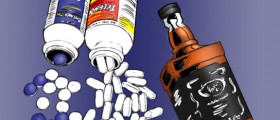
When a liver suddenly loses its ability to function, this is known as acute liver failure. In general, liver failure is a gradual process that develops over time, but in the case of acute liver failure, the liver failure occurs over the course of a mere few days. One might suffer excess bleeding and brain pressure as a result of liver failure. Liver failure will necessitate immediate medical attention. Only in some cases is acute liver failure reversible.Symptoms
If you are developing acute liver failure, you might experience jaundiced skin, abdominal tenderness, vomiting and nausea. Other symptoms include general malaise, concentration difficulties, disorientation, sleepiness and muscle tremors. If you notice yourself or anyone else developing any of these conditions, particularly jaundice, seek medical attention as soon as possible. Causes
When liver cells become damaged and lose function, liver failure occurs. One of the most common causes of liver failure is acetaminophen overdose. Acetaminophen is present in medication such as Tylenol, and liver failure might occur if you take too large a dosage. Some prescription medications can also lead to liver failure. This includes antibiotics, NSAIDS and anticonvulsants. Additionally, some herbal supplements can cause liver problems, including kava, ephedra, skullcap and pennyroyal.
Several diseases and conditions can lead to liver failure. Amongst these diseases are hepatitis A, hepatitis B, hepatitis E, Epstein-Barr virus, cytomegalovirus and herpes simplex virus. Autoimmune disease is another potential cause of liver disease. Liver cancer or cancer that spreads to the liver can lead to liver failure. Additionally, metabolic disease and liver vein diseases can also increase the risk of acute liver failure occurring. Some toxins, like those contained in some mushrooms, can lead to failure of the liver. It must also be pointed out that in some cases, the causes of acute liver failure will be unknown.Treatment
Those suffering from acute liver failure will require treatment to be performed of administered in an intensive care unit. Treatments include liver transplant, relieving excess fluid in the brain and the administration of medications that reverse poisoning. Transplants are generally only used in the case of irreversible liver failure. Medication can be used to reduce the fluid levels in the brain and also to counter the effects of liver poisoning.
If there are infections present in the liver, doctors will provide medication to counter the infection. Medication will also be given in order to prevent any severe bleeding that occurs.
















Your thoughts on this
Loading...